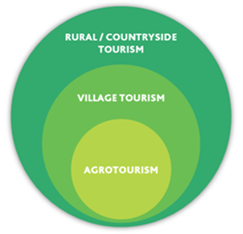Ecotourism trainings for handicraft entrepreneurs: a driver of sustainable tourism in the Carpathians
At a time when mass tourism is intensifying and concentrating on a few cities and destinations in Europe, with significant impacts on the environment but also on the lives of local people, it is crucial to promote a more responsible tourism. This can be achieved on the one hand by promoting other countries and territories as tourist destinations and on the other hand by encouraging more environmentally friendly tourism practices. In the Carpathians, these two aspects were combined in workshops targeting craftsmen and small businesses to provide them with the key tools for attractive and sustainable tourism in mountain areas.
How to build ecotourism workshops for mountain entrepreneurs?
In 2017, 4 ecotourism workshops were organised in the Carpathians, in Hungary, Poland, Slovakia and Czech Republic, to train local handicraft entrepreneurs and other rural tourism professionals on how to implement sustainable tourism practices. The initiative aimed at increasing the visibility of rural and ecotourism in mountain areas.
For 3 days, participants were introduced to different aspects of tourism through various modules. For instance, they learned more about global tourism trends and how to better attract tourists in rural and mountainous destinations, far from the main dreamed cities, thanks to alternative tourism practices such as rural tourism, active tourism and ecotourism. They were also trained to use social media and other marketing tools in order to increase the visibility of their products and services.
Moreover, participants attended a specific module on ecotourism, where they discovered various good practices and discussed the connections with other tourism practices such as rural tourism. This module was also an opportunity to reflect on the possibilities to promote local products through ecotourism and to focus on the positive impacts these practices can have in terms of tourism development in mountain areas, environmental awareness of tourists and territorial development of the area.
Among the good points of these workshops: the 3 day-training ended up with an individual session for each participant to reflect on his tourism targets and explore development possibilities with experts; an individualised follow-up made possible by the format of the workshops with a maximum capacity of 15 participants only.
Furthermore, participants received a certification at the end of the workshop.
Benefits of the workshops for the development of sustainable tourism
Developing the attractivity of the Carpathians
Increasing the visibility of the Carpathians among European tourists is important to rebalance tourism flows and encourage a win-win situation for countries suffering from over tourism and countries barely considered as potential holidays destination. Yet, there is no lack of tourism potential: when it comes to heritage sites, Poland counts 15 sites registered on the UNESCO world heritage list when Austria only counts 9 (see Culture statistics — 2019 edition); attractivity therefore relies on the marketing of mountains rural heritage, such as castles and wooden churches.
Tourism, if managed sustainably, can participate to the cultural influence of mountain areas and to their sustainable development with the promotion of quality products such as mountain foods and crafts, and specific tourism services such as mountain cycling or wildlife observation.

A booklet to expand the knowledge on mountain ecotourism
To expand the dissemination of the project’s training material, a booklet on “How to Attract Tourists: Ecotourism handbook for rural handicraft entrepreneurs and actors of tourism” was also published. This tool aims at sharing the content from the workshops and should be used as a practice guide by other rural tourism entrepreneurs in mountain areas to better showcase their territory as a tourism destination as well as the quality products and services it can provide.
With this booklet, readers can learn more on how to phrase their communication on social media, adapt their website but also on how to better value natural assets, such as high mountains and specific fauna and flora. Mountain tourism entrepreneurs can also discover more tips on how to develop active tourism, agri-tourism and ecotourism based on the needs and expectations from customers.
